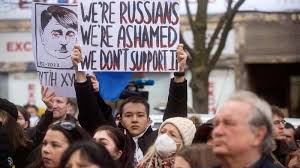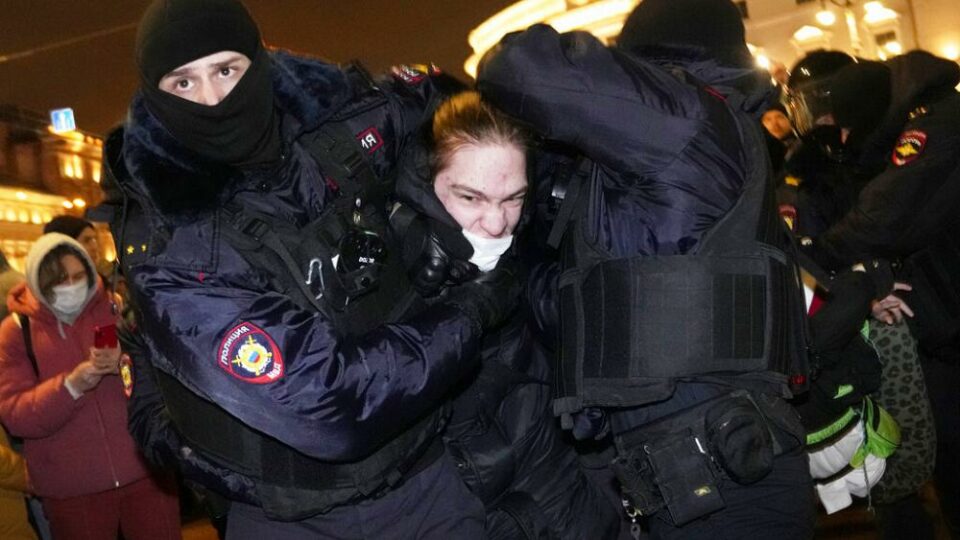
As humanity reels from a pandemic that has killed millions, and an environmental crisis that threatens most species on the planet, the great leaders of major powers (the elephants) couldn’t manage to find a non-military security solution in Europe. And as the African proverb suggests, it is everyday people who pay the price.
Over the past 30 years, US-led Western imperialism has been primarily responsible for ratcheting up tensions through NATO expansion, despite the collapse of the USSR offering an historic opportunity to devolve competing military blocs. But the past few months have seen no major rise in the threat level from NATO to Russia. It is Vladimir Putin’s unjustified invasion of Ukraine, a sovereign country, that is now unleashing suffering, bloodshed, and the horrific specter of combat escalating– even, as Putin himself has implicitly threatened, to a nuclear level.
In his speech announcing the invasion, Putin described Ukraine as a “national fiction,” thus raising the specter of annexation. Ukraine is a sovereign nation, entitled to self-determination. The invasion violates this principle. It also violates international law under the UN and several treaties, including the Budapest Memorandum of 1994, in which Ukraine gave up its large arsenal of nukes in exchange for a guarantee that Russia would never invade. So, the invasion of Ukraine by Russia is also a great setback for denuclearization.
People around the world have been telling Putin that this invasion is wrong, in mass protests, on social media, and through cultural and sports organizations. Even nation states with right-wing authoritarian regimes like Hungary and Poland, and others that have traditionally aligned with Russia like Kazakhstan, have spoken out against the invasion and offered aid to the Ukrainian people. Mexico and Kenya have stated their opposition, citing their own experiences of invasion and colonization.
Prominent Russians from all sectors have criticized the invasion: sports figures, music stars, journalists, the director of the Bolshoi Ballet and even the daughter of Dimitri Peskov, Putin’s spokesperson. Most hopefully and heroically, tens of thousands of Russian people, in Moscow, St. Petersburg and 55 other cities, have taken to the streets.
As of February 25, over 1800 had been arrested and threatened with lifelong penalties. Hundreds have faced beatings, been dragged through the streets, and been denied access to lawyers. In addition, as of Monday February 28th almost one million Russians have signed a petition condemning the invasion.

Amidst the bloodshed and destruction, the breadth of this condemnation and protest offers some hope of a world less defined by blocs and camps, where the desires of grassroots people for peace and justice become a more powerful global force.
Toward that end, we see the following steps as necessary:
- We oppose Russia’s aggression and call for its immediate withdrawal from Ukraine while at the same time opposing any effort to introduce additional foreign military forces on the ground. For us in the US, that means holding Biden to his pledge not to send in US forces.
- All non-violent methods of external support should be welcomed to defend Ukrainian self-determination.
- There need to be immediate peace negotiations, in a neutral space, that recognize Ukraine’s right to exist but also address internal, Ukrainian ethnic conflicts that have resulted in the marginalization of major sections of the eastern Ukrainian population.
- We support humanitarian aid to the Ukrainian people and especially refugees, and call on our government, with others, to welcome Ukrainian refugees.
- There needs to be a larger demilitarization and denuclearization. Ukraine gave up nuclear weapons on the promise that Russia would never invade. This is a critical point for smaller nuclear and non-nuclear nation-states that believe they are facing external, existential threats.
- NATO must be dissolved and a new, democratic, and mutually respectful approach to international relations and international security must be introduced.
To read more on this, see: